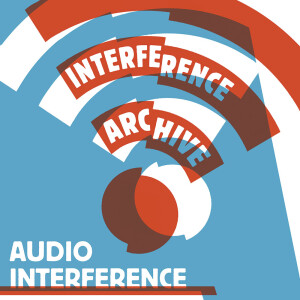
You can’t see them, but the skies above New York City hold a tangle of transgressive, culture-bearing radio signals. They’re sent from secret rooftop transmitters and pulse imperceptibly across the five boroughs, bringing familiar sounds to simple FM radios in homes and shops throughout tight-knit immigrant neighborhoods. These underground stations are often called pirates for broadcasting on the FM band without a government-issued license.In this episode, we’re sharing excerpts from an event at Interference Archive in July, which featured a conversation between David Goren and Joan Martinez. The event was presented in relation to our summer exhibition, Resistance Radio: The People’s Airwaves, which looked at the history of radio as a medium for grassroots movements and their organizing work.
David Goren is an award winning radio producer and audio archivist based in Brooklyn, NY. He’s created programming for the BBC World Service, Jazz at Lincoln Center, The Wall Street Journal magazine, NPR’s Lost and Found Sound series, On the Media, and Afropop Worldwide as well as audio-based installations for the Proteus Gowanus gallery, and the Ethnographic Terminalia Collective. In 2016 he was an artist-in-residence at Wave Farm, a center for the Transmission Arts. Over the past two years David has released “Outlaws of the Airwaves: The Rise of Pirate Radio Station WBAD” for KCRW’s Lost Notes Podcast and The Brooklyn Pirate Radio Sound Map which was featured in The New Yorker Magazine.
Brooklyn Pirate Radio Sound Map: https://www.pirateradiomap.com/
David Goren's audio documentary, "New York City Pirates of the Air": https://www.bbc.co.uk/programmes/p076bp3y
"Outlaws of the Airwaves: The Rise of Pirate Radio Station WBAD": https://www.kcrw.com/culture/shows/lost-notes/outlaws-of-the-airwaves-the-rise-of-pirate-radio-station-wbad
Joan “Radio Free Joanie” Martinez is a Brooklyn-born-and-raised Haitian-American. She attended Brooklyn College twice as an undergrad and is currently working on her Master’s Thesis about “pirate radio” in Brooklyn. She’s laid the groundwork to becoming a successful on-air talent as a podcast host. Pegged as opinionated since a teenager and a smart alec, she brings a perspective that is usually elusive to the diaspora– a female voice that represents the children of Haiti’s “Lost Generation.” She straddles two worlds–the traditional Haitian household and an American growing up in America. She is an enigma at first. Her last name confuses the people she tries to talk to–she’s often pegged as a Latino that just happens to know Haitian-Kreyol. But after a minute of talking to her, people are at ease and fascinated that she is Haitian-American. She speaks the language though her name is Latino and her citizenship is American. Some are still standoffish to her and brush her off. She remains resilient however, a trait found in the Haitian people. They thrive from adversity and feed off obstacles. She is the product of her environment and brings this to her radio broadcasting.
Produced by Interference Archive.
view more
More Episodes
Audio Interference 45: Teaching Self Defense
 2018-02-18
2018-02-18
 2018-02-18
2018-02-18
Audio Interference 42: Social Justice Tours
 2017-12-01
2017-12-01
 1
1
 2017-12-01
2017-12-01
 1
1
Audio Interference 40: The Monument Quilt
 2017-11-02
2017-11-02
 2017-11-02
2017-11-02
Audio Interference 39: Harriets Apothecary
 2017-10-20
2017-10-20
 2017-10-20
2017-10-20
Audio Interference 38: Sascha Altman DuBrul
 2017-07-14
2017-07-14
 1
1
 2017-07-14
2017-07-14
 1
1
Audio Interference 36: $pread Magazine
 2017-06-26
2017-06-26
 2017-06-26
2017-06-26
Audio Interference 35: Take Back the Fight
 2017-06-05
2017-06-05
 2017-06-05
2017-06-05
Audio Interference 30: Rob Robinson
 2017-03-24
2017-03-24
 2017-03-24
2017-03-24
Audio Interference 29: Paper Tiger TV
 2017-02-23
2017-02-23
 2017-02-23
2017-02-23
012345678910111213141516171819
Create your
podcast in
minutes
- Full-featured podcast site
- Unlimited storage and bandwidth
- Comprehensive podcast stats
- Distribute to Apple Podcasts, Spotify, and more
- Make money with your podcast
It is Free
- Privacy Policy
- Cookie Policy
- Terms of Use
- Consent Preferences
- Copyright © 2015-2024 Podbean.com






